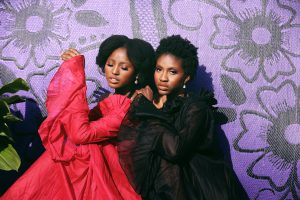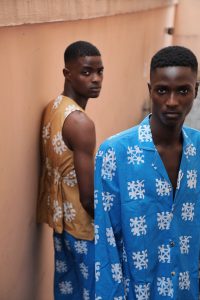Jendaya is the luxury e-commerce platform catering to the African consumer
For the continental African
For the continental African
Africa’s e-commerce sector is experiencing a huge boom. Currently, the growing industry is estimated to be $19.8 billion with further reports by McKinsey stating that these figures are set to grow to $930 billion by 2025. These stats show that there is a profitable avenue for African designers to market and sell their products globally especially as competition is growing in the luxury sector due to the rise of domestic brands. While US and Chinese retailers such as Amazon and Aliexpress have attempted to break into the African market, they are marred by a myriad of logistics issues and hefty import duties and taxes to name a few.
African e-tailers such as Konga, Jumia, and Afrikea are currently some of the home-grown names that have been working the African fashion and beauty landscape for several years now and have been credited with revolutionising e-commerce in Africa. While these players definitely deserve their stripes, there is a new generation of industry players such as Industrie Africa and Jendaya, a new e-commerce platform set to launch mid-July this year, which are redefining what it means to be a diverse luxury brand and consumer in this age.
View this post on Instagram
Patriotic sentiment behind purchasing is on the rise and the term ‘Made in Africa’ is no longer associated with cheap goods but unique, limited-edition cult pieces, however, many consumers and brands are still on the lookout for a retail experience tailored to their taste. In a recent article with Business of Fashion, Vanessa Azar, the head of L’Oréal Luxe West Africa shared some of these defining qualities which include “the quality of the platform’s image, consumers’ level of trust in the online platform, and whether the platform already has a history of selling luxury goods.” This automatically rules out e-tailers such as Jumia and Konga which have been slow to tailor their image to a specific consumer and have not exactly built the strongest track record for trust and consumer satisfaction.
This has meant that in the meantime, African consumers are having to shop for their favourite luxury items from an online store abroad and ship it to a family member in the United States or United Kingdom to deliver them back home upon their return, in order to avoid high tariffs incurred from shipping directly from those sites to their home address. This act alone shows that there is space for new players to come in and build a strong all-inclusive distribution, shipping, and logistics model. In fact, this is what inspired CEO and Co-founder, Ayotunde Rufai to start his own company, Jendaya, one of the few e-tailers championing the continental African.
Rufai got the inspiration from his Nigerian aunt who frequently shipped her luxury items to his house where she would require his assistance to ship or return items at her will. Observing this strenuous process to stay connected to the things that his aunt loved, Ayotunde began conceptualising the idea for Jendaya in 2018 before reaching out to his co-founders Kemi Adetu and Teni Sagoe. “We entered a competition with the University of Monaco which is like a luxury competition they have annually and because we made it to the semi-finals, we had to create a pitch deck and a business plan and we found it was a really viable business idea.”

Following this landmark moment at the competition in Monaco, Rufai and his co-founders would learn, unlearn, and re-learn the game several times before launching the editorial vertical of Jendaya in 2019 providing a way for their community to get comfortable with the brand. Initially meant to launch in 2020, Rufai would have to put his plans on hold when the COVID-19 pandemic hit and completely changed the way in which consumers engaged with fashion.
However, due to the fact that stay at home practices encouraged many consumers to purchase more and increase their e-spending power, Rufai was able to focus on growing the Jendaya community, meeting and connecting with names such as influencer and model Mayowa Nichols, actor Maisie Williams (known for her role as Arya Stark on “Game of Thrones”) and Frederico Marchetti, the CEO and Chairman of Net-a-Porter. He tells me that this allowed for the brand to redefine its perceptions of luxury African fashion explaining that due to the global nature of the average Jendaya consumer, “this has meant we are going for people who we deem to be real and not the standard definition of a luxury brand/influencer.”
Ahead of Jendaya’s official launch next month, we spoke to Ayotunde Rufai about the brand’s pilot phase one, the realities of e-commerce in Africa, and the future of sustainability in fashion. This interview has been slightly edited for clarity.
NATIVE: How does Jendaya plan to foster a brand identity that consumers can trust?
AYOTUNDE: I think what is really interesting is that in terms of mobile phone usage and internet use is that Africa has the second-largest digital footprint after China globally so I don’t think it’s that people are not aware of Internet usage and how to shop online. At the end of the day, Fintech is like booming on the continent and people are trying to crack the use of international banking and banking beyond banks through the internet and use of the phone and then there are platforms like Konga and Jumia which are success stories of fast fashion or the everyday use of e-commerce. Now, it’s just a matter of making convenient luxury goods for a specific demographic who engage in that and engage in it very well.
If you look at the stats of top spenders of luxury in Selfridges or Harrods, it’s always Nigerians and Africans who are part of that demographic so when they are home in Mozambique and Kenya, it’s not that they don’t know how to use the Internet because they well-travelled and cosmopolitan but the problem is building that trust and showing people that this is authentic which matches up to similar experiences shopping your home in your London or on sites such as Net-A-Porter. It’s also about understanding the nuance of being a metropolitan Nigerian or African and how they like to shop luxury and providing this for them so that they are comfortable to shop on Jendaya rather than waiting to travel to get these items.
NATIVE: How do you plan to stay on pulse with all the brands that your community is interested in?
AYOTUNDE: This is why I spoke about us being people-powered and community-driven. Also, we ourselves are the customer and have either been on ground or been of the culture or from the continent and so we know what is cool and hot and what isn’t yet but what could potentially be hot through our global community of tastemakers. In terms of setting a new diverse standard and allowing the global African shopper to discover new brands, we want to highlight the newer and exciting brands at the moment but a 100% we have Balmain, Dior, Prada, Givenchy, but the ones I want to speak about are Casablanca, Area, Tara Matthews, Marty Moto and Pablo Erroz. In terms of African brands, we also have Tokyo James, Richard Mnisi, Jermaine Bleu, Mazelle Studios, Abiola Olusola and we also have brands coming later in the year which is exciting. Things like this are always fluid so some brands will come in after we have launched.

NATIVE: Creating a reliable one-stop hub for shopping in Africa cannot be easy in a pandemic. What challenges have you had to overcome while preparing towards your official launch?
AYOTUNDE: One of them is probably just been creatively trying to convey exactly who Jendaya is onto our web development and to the visual aspect to who we say we are. In terms of conveying to our developers that this is the message and this is our objectives and mission and we need this to match up to what we are going to be launching visually. Good web developers are hard to come by so I think that’s been one thing that we have been battling with to make sure that everything gets the same experience when we launch.
Also, the logistics and the operational part of everything. So in terms of inventory and making sure we have got good enough rates coming through (because we’ve been running dummy tests) but making sure that the ones coming through are bearable as we start and just sort of working out the logistics in the backend in terms of how are we syncing our inventory levels and things like that. So those two things are probably the biggest hurdle at the moment; making sure that our identity is kind of presented well visually for when we launch and the logistics and operational aspect of the whole journey.
NATIVE: Also with the pandemic, a lot of consumers have turned to e-commerce and online shopping. Would you agree with the statement that the future of fashion is going to be a lot more sustainable, community-driven, and social-oriented?
AYOTUNDE: That’s exactly what it is because even pre-pandemic, we’ve kind of seen that the buzzword in fashion has been sustainability and community. I think the pandemic just really exasperated this and sped this realisation up so that a lot of brands who weren’t focused on their digital strategy, we saw like so many brands doing things online and tapping into the theme of diversity and equality and I think the pandemic just really sped this up and we actually saw these strategies in play. 2020 was good for the realisation of a lot of things we had already known and we were working towards and we just saw that in real-life action, last year gave birth to a few platforms which are mainly Black-owned such as Black Owned Everything and Black Fashion Fair but they are a testament of speaking to a specific community and the power of community and how you can be direct and unapologetic and create new standards for what it means to be luxury and cater to the luxury consumer. I think this has made way for platforms like ours to kind of thrive now. If anything, last year helped prove the content or the market more than anything else.
NATIVE: This year, Jendaya also partnered with Positive Luxury to work on some initiatives aimed towards the sustainable development of brands out of Africa. How do you plan to go about this partnership?
AYOTUNDE: That’s actually coming along because it’s still the early days of that partnership because the idea for us is that we want to empower brands and show them the value of being on Jendaya. So, if there are ten to twently Western brands, the same should also be done for African brands too so, for us, we want to proliferate and promote the work of African brands on our platform. But also, through collating the sales metrics and sales data on Jendaya, brands will be able to apply for business loans tailored to their earnings from our stats. We are also working with matching them up with other retailers not only those stocked on Jendaya that they can use to boost their visibility and showcase their work.
NATIVE: When will Jendaya be available to the public?
AYOTUNDE: Currently, July 21st is the official date we have now. Initially, it was July 1st but again what we are doing with visual representation has a lean-on effect for other things because we need the visuals to match. All roads lead to then.
Featured image credits/MazelleStudioxLouisVuitton/Jermaine Bleu/Torlowei
Tami is the Community Manager. Pitch an idea on our For Us By Us column for Pride Month

